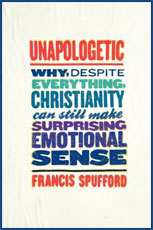Frances Spufford is a Fellow at the Royal Society of Literature and teaches at Goldsmiths College in London. In this book, published to great acclaim in England, he offers a spunky and creative defense of Christianity which has been battered and bruised by attacks from Richard Dawkins and the late Christopher Hitchens. Spufford refuses to put himself in the same category as C.S. Lewis and Dorothy Sayers who stood their ground against those who were highly critical of Christians, their hypocrisies and war-mongering in the name of Jesus the peacemaker. Spufford believes that "humanity glimmers with God's presence" and the glories of God's grace but is reluctant to defend the concept of hell, the ennobling potential of suffering, or the existence of eternal life. Spufford feels connected with Yeshua, the first-century Jew who modelled our responsibility to do all we can to mend the world. The author is also impressed with this character quality:
"[Yeshua] does not denounce anything. He does not seem to be disgusted by anybody, anybody at all. It is as if, shockingly, what we do in bed is not specifically important to him."
Spufford's views of Christianity make it clear that he would agree with Hafiz, the Sufi poet who wrote a poem called "A Great Injustice" which has these lines:
"It is a great injustice and a monumental act
of cruelty for any religion to make someone
fear God."
